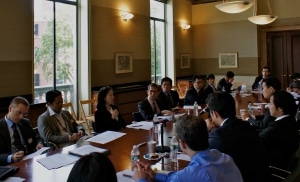AN ENHANCED AGENDA FOR US-JAPAN PARTNERSHIP
» Programs
2007–2011
JCIE and the Japan Foundation Center for Global Partnership undertook a study to explore how bilateral cooperation can be deepened in order to face common challenges, strengthen regional and global stability and prosperity, and, ultimately, make the US-Japan alliance more robust and versatile in light of wide-ranging developments that had begun to reshape Asia at the start of the 20th century. The evolution of new regional relationships and institutions will ultimately necessitate fundamental adjustments to the US-Japan relationship. Accordingly, this project convened promising young Japanese and American experts to survey Japanese and US policy on five key issue areas, identify areas of potential divergence and convergence, and examine where deeper bilateral cooperation or coordination may be natural and potentially make a meaningful regional or global contribution.
On January 9–11, 2009, the study team came together again for several days of programs in Tokyo and Shimoda. On January 9, the study team participated in a roundtable with foreign ministry officials entitled “Global Challenges and Japan’s Strategy” and had a series of meetings with experts on US-Japan relations. The study group then traveled to Shimoda, site of the historic Shimoda Conference, for a two-day workshop where each participant made an in-depth presentation on the progress of their research since the last study group meeting.
On September 16, 2011, several members of the project team, including Tetsuo Kotani, John Park, Ryo Sahashi, James Gannon, and Llewellyn Hughes, reconvened in Washington DC for a roundtable discussion on “Domestic Political Change and the Agenda for US-Japan Partnership” co-hosted by JCIE and the German Marshall Fund of the United States. Bringing together more than 20 participants, the roundtable explored recent changes in the US and Japanese political landscapes and the resulting impacts on US-Japan relations in a number of functional areas, such as fiscal policy, disaster management strategies, nuclear and energy policy, and military cooperation.

PROJECT REPORTS
An Enhanced Regional Architecture for East Asia: Managing Globalization, Power Transition, and Domestic Fragility
Satoru Mori, Professor, Hosei University
Satoru Mori proposes that Japan and the United States team up to make the East Asia Summit more action-oriented by helping to create an East Asia Cooperation Council to negotiate concrete rules of the road for member states and coordinate cooperative initiatives on regional issues.
US-Japan Cooperation on the Reform of International Organizations
Philip Lipscy, Assistant Professor of Political Science, Stanford University
As the global balance of power shifts toward Asia, Phillip Lipscy argues that the United States and Japan should play a greater role in reforming international organizations to meet the challenges of the 21st century by advocating for a redistribution of voting rights, a decentralization of functions, and other structural changes.
A New Framework for US-Japan Development Cooperation
James Gannon, Executive Director, JCIE/USA
Analyzing the impact of the Common Agenda and other bilateral US-Japan efforts to cooperate on development assistance, Jim Gannon calls on the two countries to launch a new development initiative that focuses on East Asia.
Freedom of Navigation and the US-Japan Alliance: Addressing the Threat of Legal Warfare
Tetsuo Kotani, Special Research Fellow, Okazaki Institute
Tetsuo Kotani urges the United States and Japan to work together more closely to combat efforts by China and other countries to exploit gaps in international law and use “legal warfare” to ensure freedom of navigation in Asia Pacific and elsewhere.
Revitalizing US-Japan Collaboration on Global Health
Eriko Sase, Lecturer, Graduate School of Medicine, University of Tokyo and Susan Hubbard, Senior Associate, JCIE/USA
As health issues become a major challenge to stability and prosperity in our increasingly globalized world, Eriko Sase and Susan Hubbard propose that Japan and the United States leverage one another’s respective strengths for joint initiatives to improve public health in developing countries in Africa and Asia.
The Rise of China and the Changing Regional Security Architecture
Ryo Sahashi, Associate Professor, Kanagawa University
Arguing that China’s rise and the course of US-China bilateral relations will play a predominant role in determining the future shape of Asia, Ryo Sahashi proposes that Japan take a nuanced approach that strengthens the US-Japan alliance while helping reshape the regional order to embed China as well as Japan and the United States more deeply in cooperative initiatives in the region.
RESEARCH TEAM
Senior Advisor
HITOSHI TANAKA, Senior Fellow, JCIE
Military-Military and Civil-Military Cooperation on Nontraditional Security
TETSUO KOTANI, Special Research Fellow, Okazaki Institute
JOHN PARK, Senior Program Officer (Northeast Asia), Center for Conflict Analysis and Prevention, United States Institute of Peace
Energy, Environment, and Climate Change
LLEWELYN HUGHES, Assistant Professor of Political Science and International Affairs, George Washington University
SHOICHI ITOH, Visiting Fellow, Russia & Eurasia Program, Center for Strategic & International Studies (CSIS); Senior Researcher, Institute of Energy Economics, Japan (IEEJ)
Human Security Aspects of Global Health and Other Development Issues
JAMES GANNON, Executive Director, JCIE/USA
ERIKO SASE, Lecturer, Department of Community and Global Health, Graduate School of Medicine, University of Tokyo, Japan
Managing the International Financial System
YUKO HASHIMOTO, Economist, International Monetary Fund; Associate Professor, Faculty of Economics, Toyo University
Regionalism in East Asia: Bilateralism and Multilateralism
PHILLIP LIPSCY, Assistant Professor of Political Science, Stanford University
SATORU MORI, Professor, Faculty of Law, Hosei University
RYO SAHASHI, Tokyo Foundation-German Marshall Fund Partnership Fellow; Research Fellow, Japan Center for International Exchange; Associate Professor, Kanagawa University
